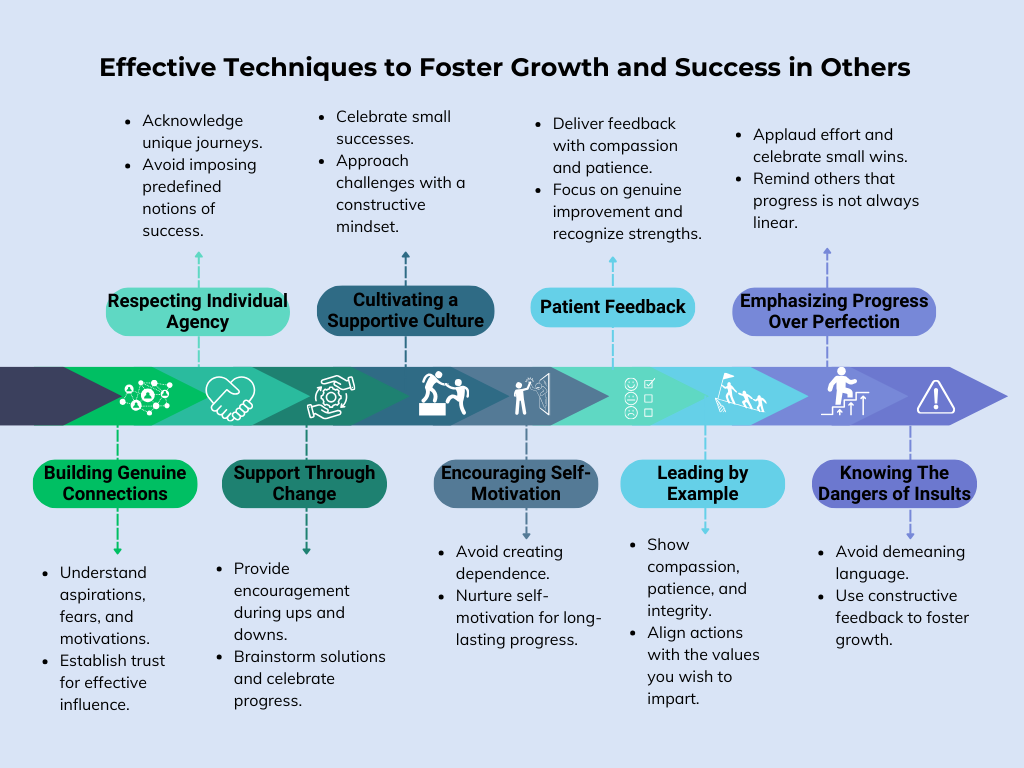Igniting the Spark Within: Empowering Others Through Connection and Understanding
Learn practical strategies for fostering growth and avoiding counterproductive pitfalls in personal and professional relationships.
PROJECT TEAMS
Iyanna Trimmingham
11/11/20233 min read


Today, let's dive into a crucial aspect of personal and professional growth: "Empowering Others." I started thinking about this topic after witnessing someone's well-intentioned but unsuccessful efforts to guide another person toward success. The inspiration struck me during a conversation with a frustrated influencer who, despite years of trying, couldn't seem to steer their friend in the right direction. Unfortunately, these attempts not only faced resistance but also drained the influencer financially.
Things reached a boiling point, and the frustrated influencer resorted to insults, unintentionally making the recipient feel inadequate. This incident made me reflect on moments in my career when senior executives praised my ability to bring out the best in others. It often led them to seek my advice in similar situations.
Now, recognizing that I'm an outsider to the incident, I know there might be complexities in their relationship that I can't fully grasp. But drawing on my experiences, I want to share what consistently works for me in personal and professional relationships. This article aims to be a guide, exploring strategies that empower others without resorting to futile and counterproductive measures.
The incident is a stark reminder of the pitfalls of trying to influence others without a thoughtful and empowering approach. It shows the dangers of coercion and the potential harm when frustration overshadows constructive communication.
Let's talk about some strategies for empowerment:
Building Genuine Connections: One key principle that has always worked for me is building genuine connections. To guide someone toward success, you need to understand their aspirations, fears, and motivations. A real connection establishes trust, laying the foundation for effective influence.
Respecting Individual Agency: The incident highlighted the need to respect individual agency. While guidance is essential, imposing a predefined notion of success can lead to resistance. Everyone's journey is unique, and acknowledging their autonomy is crucial for fostering a collaborative and empowering relationship.
Support Through Change: When someone is venturing into the unknown, a strong support system can make a significant difference. Encouragement during ups and downs, reminders of progress, and brainstorming solutions together can provide the confidence needed to persevere.
Cultivating a Supportive Culture: Empowering others thrives in a culture of support and encouragement. Celebrating successes, no matter how small, and approaching challenges with a constructive mindset contribute to a positive and growth-oriented environment.
Encouraging Self-Motivation: While providing support, avoid creating dependence. The goal is to empower others to tap into their strength and capability. Nurturing self-motivation allows them to strive, learn, and develop new skills independently. Progress stemming from self-motivation is more likely to be long-lasting.
Patient Feedback: Constructive feedback is crucial for growth, but delivery matters. Thoughtful, supportive feedback focused on genuine improvement empowers rather than defeats. Understand the other person's perspective, recognize their strengths, and provide insight on areas for improvement with compassion and patience.
Leading by Example: Empowering others is a patient and persistent process. Lead by example, showing compassion in struggles, patience in slow progress, and integrity in challenging times. Your actions should align with the values you wish to impart, building credibility and trust.
Emphasizing Progress Over Perfection: Avoid stifling growth by holding unrealistic standards. Emphasize effort over outcomes, applaud initiative, and celebrate small wins. Progress, no matter how gradual, creates confidence and momentum. Remind others that comparisons are destructive, and progress is not always linear.
The Dangers of Insults: Insults are a counterproductive strategy. The regrettable incident serves as a cautionary tale—demeaning language damages self-esteem, erodes trust, and hinders collaboration. Constructive feedback, delivered with empathy, is a more effective tool for fostering growth.
In conclusion, the incident that sparked this exploration is a poignant example of the need for an empowering approach in guiding others toward success. It reinforces the significance of genuine connection, respect for individual agency, patience, and the dangers of counterproductive strategies like insults. As we navigate personal and professional relationships, let's embrace the collaborative journey toward success, recognizing that true empowerment lies in fostering growth with empathy, understanding, and support.

